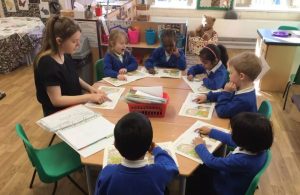With the deepening research into early childhood education practices, the focus on young children’s learning qualities has increased significantly. Based on an understanding of the concept and influencing factors of learning qualities in young children, it is essential to recognize the impact of play on these qualities. Additionally, exploring strategies to use play to enhance young children’s learning qualities can help educators purposefully design play activities that promote positive learning behaviors, supporting the development of young children’s learning activities.

I. Learning Qualities in Young Children in 2024
A. The Concept of Learning Qualities in Young Children
Learning qualities in young children encompass the habits, styles, and attitudes formed through diverse learning methods. These qualities fall under the category of non-intellectual factors, focusing not on the knowledge and abilities children acquire but on how they exhibit these abilities during learning. For instance, qualities such as curiosity, initiative, focus, and persistence are crucial. Moreover, learning qualities are fundamental to children’s acquisition of knowledge and skills, significantly influencing their experiences of success. Innovation and problem-solving abilities are also key components of learning qualities.
B. Factors Influencing Learning Qualities in Young Children
Various factors influence the learning qualities children display during their learning processes. These factors include intrinsic elements like cognitive characteristics and age-specific traits. For example, younger children may have shorter attention spans, while older preschoolers might demonstrate greater innovation due to accumulated knowledge. External factors, particularly the structured activities in daily preschool education, also play a vital role. Teachers can positively impact children’s learning qualities through planned and purposeful activities, often facilitated through engaging play activities.
II. The Impact of Play on Learning Qualities in Young Children in 2024
A. Play Stimulates Curiosity
Teachers can harness the power of play to stimulate children’s curiosity, thereby fostering an intrinsic motivation to explore and learn. For instance, organizing a floating and sinking game with various household objects like blocks, spoons, and balls can capture children’s interest. Once engaged, children are encouraged to explore and draw conclusions about the properties of floating and sinking objects, promoting their inquisitive nature.
B. Play Guides the Development of Positive Learning Behaviors
Positive learning behaviors, including initiative, focus, and persistence, can be cultivated through play. Teachers can design task-oriented play activities that encourage children to plan and execute their actions, thereby fostering a proactive approach to learning. For example, by setting up a game that requires following a plan, children can develop the habit of planning and executing tasks, enhancing their learning initiative.
C. Play Supports the Development of Creativity
Creativity is a crucial component of learning qualities. Teachers can effectively nurture children’s creativity through practical play activities. For example, creating suitable play scenarios and encouraging role-play, such as children taking on the role of caregivers in a pretend play setting, can stimulate their creative thinking and problem-solving skills.
III. Strategies for Promoting Learning Qualities through Play in 2024
A. Stimulating Innate Learning Desires through Play
Teachers can tap into children’s innate desire to learn by providing relevant and engaging play materials and opportunities for independent play. By interacting with these materials, children develop an interest in exploring related knowledge. Additionally, encouraging children to come up with their own game ideas, such as assigning roles in a bus scenario, helps enrich their life experiences and reflects their natural learning instincts.
B. Constructing Thought Processes through Play
Play can support the development of children’s thinking patterns, promoting positive learning qualities. Teachers can guide children to adopt orderly and comprehensive thinking through play. For instance, in construction play areas, teachers can help children plan their builds and solve problems, like choosing materials, during the play process. Recognizing that building thinking patterns is a gradual process, teachers should use practical play activities to nurture this development.
C. Fostering Individuality through Play
Individuality significantly influences the formation of learning qualities. Teachers should encourage children to explore their identities through purposeful play activities. Play allows children to develop a correct self-perception and recognize their value. In exploratory play, teachers should provide ample time and encourage children to express their discoveries, fostering a personalized approach to learning and promoting holistic development.
In conclusion, teachers play a crucial role in enhancing young children’s learning qualities through well-designed play activities. By stimulating curiosity, guiding positive learning behaviors, supporting creativity, and fostering individuality, teachers can significantly influence the development of young children’s learning qualities, laying a strong foundation for their future educational endeavors.



